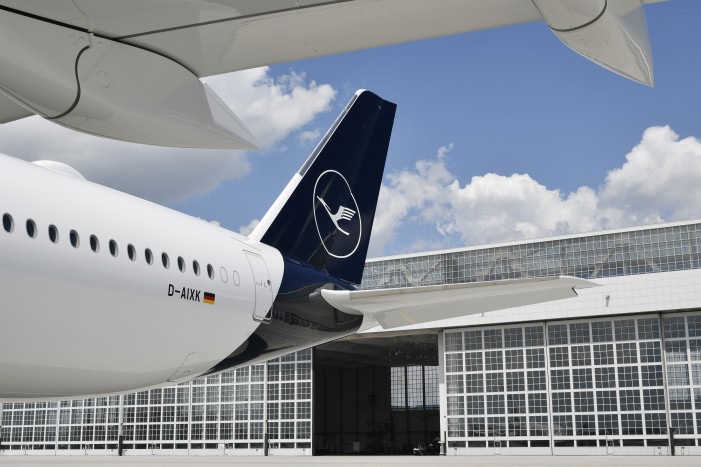Just a few phrases of orientation first: I’m absolutely conscious of the context and the self-awareness from which I’ve arrived on the following realisation. For years I too have been a part of the expansion system talked about on this textual content. Consequently, I need to additionally settle for criticism for having benefited from this “system”. I utterly stand by that. When progress tempts you, it’s troublesome to look past what lies immediately in entrance of you. However I want to at the least have the prospect to train constructive self-criticism – from my present, most actually privileged, place. In any case, I’m additionally beginning to observe a change of coronary heart amongst many present and former colleagues. And this transformation of coronary heart, I imagine, comes on the proper time.
An unprecedented rescue parachute – at excessive velocity, and identical to that?
World wide, airways have obtained greater than US$85 billion in rescue funds. In any other case, Covid-19 would have wiped them out. This manner, jobs on the immediately impacted airways in addition to inside the whole ecosystem round airports will likely be saved. Connections to locations and markets will stay secured. In our carefully interlinked world, flight connections that present these entry factors for individuals and items are important, particularly in instances of disaster.
Then again, $85 billion is under no circumstances a petty little matter. Such vital sums are actually linked to far-reaching circumstances – aren’t they? Probably not. The circumstances connected to the rescue packages have been minimal at each nationwide and worldwide degree. Relying on the way you take a look at it, that is both a lucky or a relatively unusual improvement. Keep in mind how banks and monetary establishments in lots of nations got powerful necessities in connection to the cash they’d obtained in the course of the monetary disaster?
Is that this appropriate? Shouldn’t states and regulators take a distinct method and a more durable line with aviation? Extra exactly, shouldn’t they demand a higher resistance to future crises, in different phrases, a extra sustainable dealing with of the nationwide wealth they’ve collected?
One factor is for certain: the subsequent assertion of systemic relevance in an distinctive state of affairs will, as a lot as we would favor it to not, come again to hang-out us a lot before anticipated. The time to behave and to make use of the disaster as a chance for change is now. This manner, the lead time till the subsequent occasion could be lengthy sufficient in order that the begging bowl held out for state support won’t be fairly as huge. A giant pro-active liberating blow, one would possibly say. However the right way to go about it?
Greater fairness ratios, improved danger protection, new ideas for liquidity administration: in Switzerland, the ‘Basel III’ framework, the BIS laws on banking regulation, has change into way more restrictive within the wake of the monetary disaster. On the time, there was a comparatively broad consensus that individuals – and “individuals” in these circumstances at all times means “all of us” – didn’t need to bail out the banks once more with billions of {dollars} in authorities cash. In most worldwide monetary centres related systematic measures may very well be noticed. I might additionally prefer to level out that plenty of systemically essential banks subjected themselves to much more far-reaching safety necessities. And these have taken impact, not least within the present disaster.
The assorted funds that Greece, as a nation state, obtained from the EU from 2010 onwards to avoid wasting the nation from chapter had been additionally linked to the implementation of quite a few reforms and funds consolidation measures. In lots of different locations, the EU Fee, the IMF and the ECB additionally imposed powerful circumstances for monetary support.
Nevertheless, within the case of airways – which up to now have already been depending on authorities help on a couple of event – the phrases imposed are minimal. Though, relying on who you discuss to, opinions do differ: for the Swiss confederation, for instance, it’s mainly essential that the funds which might be spoken don’t go to Germany. “Strict” is totally different. Airline-related companies are additionally speculated to guarantee that any of the funds obtained won’t movement overseas. In different nations, the circumstances for bailout cash are even much less stringent. I absolutely sympathise with taxpayers who’re stunned about this.

A bit of little bit of the distress is self-inflicted
Lately, many airways have invested massively of their progress, shopping for (not leasing) plane, increasing connections – and launching worth wars not simply within the short-haul section. In doing so, now we have change into extremely depending on a really unstable mass section, and, as a matter of reality, up to now ten years even used this section as our growth-engine. The outcome: the “golden decade” of aviation. This, nonetheless, had one aspect impact: all of us uncovered ourselves, absolutely unprotected, to the danger of straining the supply-and-demand precept to such an extent that the big progress in demand was pushed by an oversupply of capability. This has additional diminished the already low margins. Provisions had been made solely very cautiously, if in any respect. Lately, US airways have spent greater than 90 per cent of their income to purchase again shares – and thus made short-term traders comfortable. All of us might work out that this fixation on progress and low margins make the {industry} depending on exactly this extremely unstable demand. Not like every other sector, the airline enterprise is thus extremely delicate to financial and social developments. And it’s so on a world degree.
In fact, it can’t be denied that in instances of disaster even giant money reserves won’t final for a protracted time period. The airline enterprise is capital-intensive. And it’s in fact somewhat unfair to make these observations throughout a world pandemic. In any case, Lufthansa chief government, Carsten Spohr, is correct when he not too long ago acknowledged in Neue Zürcher Zeitung: “It’s virtually inconceivable to arrange for a disaster of this dimension, wherein 99% of the enterprise disappears over months. The required buffer can be so immense that no globally working airline might deal with it”.
A bit of restraint and customary objectives can be win-win
However, now’s the time to cease turning a blind eye: airways should higher safe their enterprise. They should guarantee stability as greatest they will and draw up future-oriented, sustainable monetary plans. Strong danger administration and enterprise continuity methods are the instruments of the commerce – now greater than ever. Lufthansa and United Airways are already extra persistently leasing plane relatively than shopping for them and have began adapting their route networks.
The identical applies to enterprise planning and money, well being and security and local weather and safety requirements. Right here too, I’ve lengthy been satisfied that the {industry} can be higher off “regulating” itself. Particular person airways are making a serious effort to contribute to local weather safety. Swiss, for instance, is investing in a very fuel-efficient fleet. Singapore Airways has modified the Trent 900 engines of its A380 plane to scale back CO2 emissions. KLM saves weight. Etihad is experimenting with flights with out the usage of single-use plastic. However calls for are excessive, and the highway is lengthy.
The problem, whether or not it’s about environmental, security or accounting points, is as follows: if the {industry} doesn’t develop uniform requirements – or at the least units uniform objectives –, then others will do it for them. They usually actually won’t do it in a coordinated method. This ought to be clear to the chief government in addition to to the chief monetary officer and the top of company social accountability.
If totally different guidelines of the sport apply in each nation, they change into extremely demanding and complicated to adjust to. And it doubtlessly distorts competitors much more. States that help airways are the one ones that might introduce notably free laws. I fail to grasp why there isn’t a higher momentum behind industry-wide efforts to manage this as soon as and for all, and on a big scale. That would definitely be useful for everybody.
Collectively into the longer term
Corona exhibits us once more that it’s not simply “the eleventh hour” – time is actually working out. The {industry}, ideally our whole ecosystem, should react now. That self-regulation can work in shut cooperation with the authorities is proven by a latest instance of the European Plane Associations and the European Aviation Security Company. Along with the European Centre for Illness Prevention and Management, they’ve compiled pointers for airports, airways, and operators to make sure that passengers can journey safely even in instances of corona. Which can make life simpler for all of us.
We are able to not shut our eyes to the truth that the world with and after Corona is a distinct one. Allow us to face this problem collectively and reposition the {industry} in a brand new and higher method. We’re higher outfitted than others to do that.
Extra Data
Aviation analyst Peter Baumgartner is the chairman of the board of administrators and Metrocore Aviation Group.

